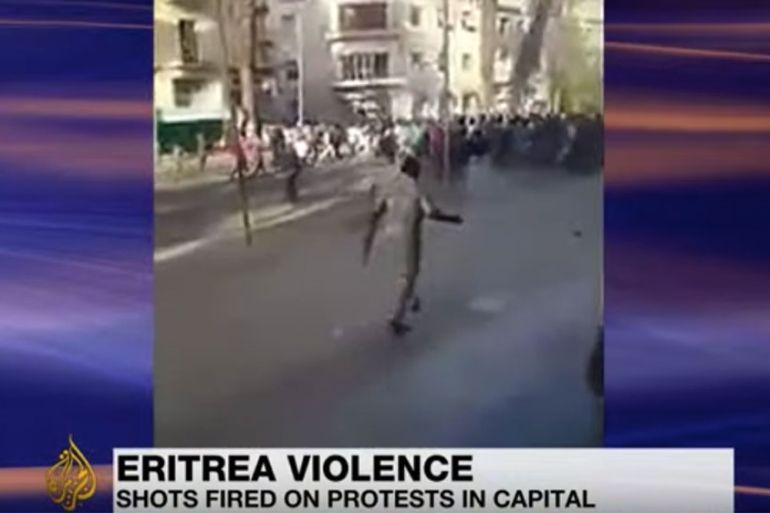Eritrea opposition: Security forces kill 28 protesters
Groups raise alarm as security forces open fire on protesting students after government crackdown on Islamic school.

Security forces killed at least 28 people in rare protests in the Eritrean capital, an opposition group has claimed, raising concerns from human rights groups and activists.
The violence witnessed in demonstrations in Asmara on Tuesday also prompted a safety warning from the US embassy in Eritrea, which confirmed receiving reports of gunfire and advised people to stay away from areas where protests were taking place.
Keep reading
list of 4 items‘Bleak milestone’: UN says 3 million forced to flee in Myanmar conflict
Tunis police raid sees refugees abandoned near the border with Algeria
UK has begun mass arrests of potential Rwanda deportees: What’s next?
The opposition Red Sea Afar Democratic Organization wrote on its Facebook page on Wednesday: “This uprising has left 28 martyrs and 100 wounded … we call on the international community and human rights organisations to bring those involved to justice.”
Activists told Al Jazeera that the protests began on Tuesday after the government ordered an Islamic school to ban the headscarf and halt religious education.
The violence centred on the predominantly-Muslim neighbourhood of Akriya, where the Diaa Islamic School of Asmara of 3,000 students is located.
Displays of public protests are rare in Eritrea, a country often criticised for human rights abuses.
President Isaias Afwerki has been in power since 1993.
Hundreds of students reportedly joined the protests, and the crowds continued to grow later.
The US embassy has not confirmed the deaths.
‘Black hawk dawn moment’
“The government attempted to confiscate Al Diaa Islamic School, an institution established in the late 1960s,” Meron Estefanos, an activist based in Sweden, told Al Jazeera.
“The current unrest was triggered by the government’s arrest of Haj Mussa who was the honourary president of the Al Diaa school.”
She claimed that security forces beat students, who retaliated by throwing stones.
“Soon, the rallies spread to the streets of central Asmara where the security forces used brute force to quell the protests,” she said.
“This moment is the true meaning of a bottled up feelings and years’ worth of oppression that is now surfacing. I believe the people of Eritrea have tolerated so many things for so long and now it is time to express and stand up for their rights.”
But Yemane G Meskel, Eritrea’s minister of information, dismissed the reports of casualties.
“Small demonstration by one school in Asmara dispersed without [casualties] hardly breaking news,” he tweeted.
Eritrea, which borders Ethiopia, Sudan and Djibouti, often features towards the very end of indices on freedom of expression, close to countries such as North Korea.
“I think it’s a draconian measure, yet again in controlling the Eritrean public and squeezing out any public space and any freedom of expression,” Selam Kidane, a London-based activist, told Al Jazeera.
“Asmara is a peaceful city, but this has been described as a black hawk dawn moment – nursery school children were being chased through the streets.”
She said that young people have “taken matters into their own hands” because Eritrea is a “country ruled by fear”.
“People are taking enormous risk and it’s a courageous step to take,” Kidane said.
‘Bound to happen’
In June this year, Sheila B Keetharuth, UN Special Rapporteur on the situation of human rights in Eritrea, said citizens suffer arbitrary arrest, incommunicado detention, enforced disappearances, and a national service system that amounts to enslavement.
Tuesday’s protests have “opened a big door”, Saleh Gadi Johar, a California-based author and activist, told Al Jazeera.
“They [people] snapped. Even if it’s quelled for a time, it will rise again. I expect others are inspired. All denominations of Eritreans – particularly the young -have joined.”
Johar, who also edits awate.com, a dissident website, said he believes the Eritrean government would arrest anybody it didn’t like.
The warning from the US embassy, he said, was not a sign of a major political development.
“I don’t expect anything from US and West when Eritreans are suffering. It’s politics as usual.
“Being an Eritrean, I don’t wish any bloodshed of violence for my country – people have gone through a lot. I wish for a peaceful transition to calm. But if that doesn’t come, then such appeal should be expected. It’s sad its happened, but it was bound to happen.”
Follow Anealla on Twitter: @anealla